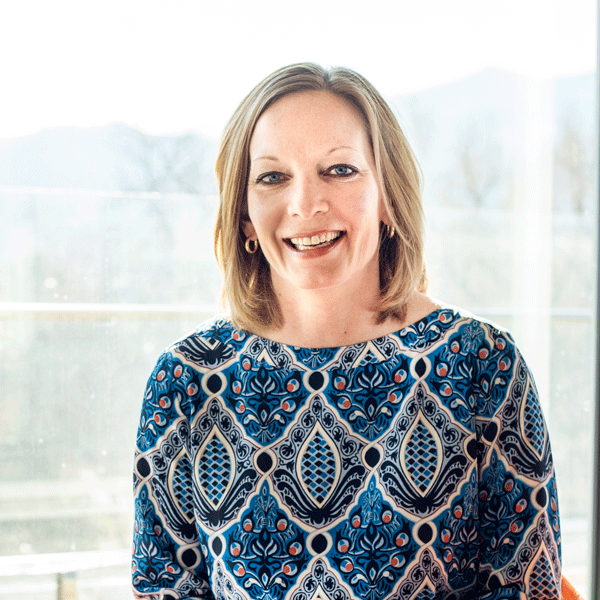Colorado College Associate Professor of Business Kat Miller-Stevens has been named the new director of CC’s State of the Rockies Project.
Miller-Stevens’ interdisciplinary research bridges the areas of business, public policy, social impact, and nonprofit studies. Her research explores how social movements and collaborations create social change to influence policymakers and powerful industries. She is especially interested in the sharing of knowledge and resources, leadership and governance issues, and community and environmental impacts of social movements and collaborations. Those interests are not so much a jump to the State of the Rockies Project as they are a bridge to new endeavors.
Miller-Stevens hopes to advance the role of nonprofit advocacy organizations in environmental policy issues, saying there is an intersection between public policy, nonprofits, and social and environmental issues. She believes the interdisciplinary approach to the State of the Rockies Project will “open up many discussions.”
She also hopes to reach students by increasing the range of State of the Rockies’ opportunities, citing the current Orange Skies project as an example. The aim of the student-curated photo exhibit of Western wildfires is to capture the social and ecological effects of the record-breaking 2020 fire season. This project, originally developed by Project Specialist Cyndy Hines, appeals to students with a variety of interests. “That’s what I’m looking for, creative and innovative opportunities for students,” says Miller-Stevens.
The title of 2021 State of the Rockies research project is “Understanding Policy Debates on the Future of Hydraulic Fracturing and Abandoned Wells in the Rocky Mountain West,” a topic Miller-Stevens says lends itself to an interdisciplinary approach. She and CC student researchers will collaborate with fracking industry specialist and policy analyst Jonathan J. Pierce, the vice president of Safeguard Marine, LLC, and Adjunct Professor at CU Denver.
“The exciting part is that we will be collaborating with a published industry expert in fracking policy,” Miller-Stevens says. “We will be looking at the social movements around fracking and how nonprofits impact policy public related to fracking.”
She notes the growing environmental and economic problems caused by bankrupt energy companies abandoning their fracking wells in the wake of falling oil and gas prices. The clean-up and plugging of these wells then becomes the responsibility of local and state governments. This has sparked policy debates and political battles in the states about how to best regulate or even allow hydraulic fracturing. Miller-Stevens developed the 2021 research project last summer keeping the uncertainties of COVID-19 situation in mind. As a result, the project is one that student research fellows can conduct remotely.
The purpose of the research project is to better understand the policy debates around the future of hydraulic fracturing and abandoned wells in the Rocky Mountain West, she says. This year’s goals include:
- Exploring consequences of hydraulic fracturing and abandoned wells on people and their environments
- Exploring how grassroots social and cultural ideas shape social movements and public policies related to hydraulic fracturing and abandoned wells
- Investigating social justice and environmental justice issues pertinent to hydraulic fracturing and abandoned wells
- Researching the positive and negative economic impacts on communities impacted by this industry
- Exploring how the business strategies of oil and gas corporations change in response to social movements and public policies.
Based on their specific interests, each summer research fellow will design and conduct a research project that addresses one or more of these issues. Their findings will be shared with the CC community, local decision-makers, nonprofit advocacy organizations, and other stakeholders, as well as presented at academic conferences and potentially submitted for publication in peer-reviewed journals.
Miller-Stevens, who holds a Ph.D. in public affairs from the University of Colorado-Denver, joined the CC faculty in 2016. She teaches classes in Nonprofit and Business Management, Financial and Managerial Accounting, and Social Entrepreneurship. Miller-Stevens serves as the faculty director of CC’s Public Interest Fellowship Program and the Nonprofit Initiatives program. She also is a faculty adviser for the Quad Innovation Alliance. In 2020, she was named the Bill Barton Professor of Economics and Business.






